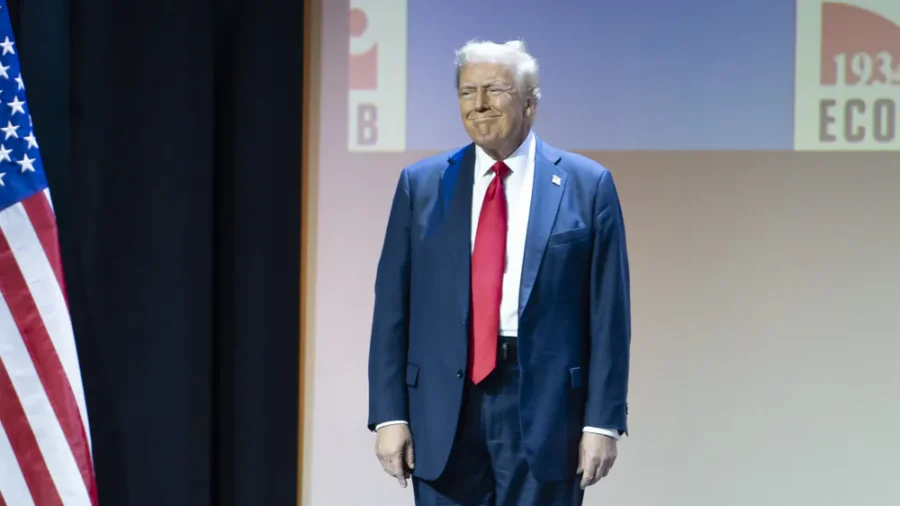Former President Donald Trump said he would put an end to double taxation on U.S. citizens who live outside the country, if elected in November, with the promise marking the Republican presidential nominee’s latest campaign pledge to lower taxes on Americans.
U.S. law requires Americans to file tax returns every year, even if they live and work abroad. It also requires them to potentially pay taxes to the IRS on their worldwide income in addition to any taxes they may have to pay in their country of residence, which is known as double taxation.
While there are accommodations such as the Foreign Earned Income Exclusion (FEIE) and the Foreign Tax Credit (FTC) to mitigate double taxation, such arrangements reduce U.S. tax liability but may not eliminate it.
Trump is now promising to eliminate the complexity of navigating U.S. tax obligations abroad by putting an end to double taxation for Americans overseas “once and for all,” he said in an Oct. 10 video statement.
“You’ve been wanting this for years, and nobody has listened to you, and you deserve it, and I’m going to do it,” Trump said. “It’s the right thing to do, and no American leader has ever been willing to stand up and commit to you the way that I have on many things, but this is a very important element for your safety, security, and, frankly, for your wallet.”
In his remarks, the former president urged overseas Americans to vote, framing the election as a critical opportunity to turn around what he said was a country in decline.
“We’re in a failing nation, and we’re going to bring it back, and we’re going to bring it back strong,” he said. “You have to make sure that you are registered and you are going to vote, because I’m going to take very good care of you. I’m going to take care of our nation.”
While Trump has not released a detailed tax plan as part of his campaign for the White House, he has floated some tax policy proposals, including extending the expiring 2017 Tax Cuts and Jobs Act (TCJA) changes, exempting tips and overtime pay from tax, and leaning heavily into tariffs to support U.S. manufacturing.
Trump has said he would incentivize producers to make their goods in the United States by cutting the current 21 percent corporate tax rate to 15 percent, but only for companies that make their products in the country. He has also stressed his intention to protect America’s auto industry by imposing high tariffs on imported automobiles.
On the same day that he pledged to end double taxation for Americans living abroad, Trump told a gathering of some 500 business leaders at the Detroit Economic Club that he would introduce new tax incentives aimed at revitalizing the U.S. auto industry. These incentives include expanded tax credits for research and development, full expensing for new manufacturing investments, and a 100 percent tax write-off for heavy equipment in the first year after purchase.
At the Detroit event, the former president took aim at Chinese auto manufacturers building auto plants in Mexico with plans to export those vehicles to the United States.
“I will impose whatever tariffs are required, 100 percent, 200 percent 1,000 percent,” he said. “They are not going to sell any cars into the United States with those plants.”
At the gathering in Detroit, the former president also said that he has plans to allow small businesses to double the amount they can deduct for equipment purchases, from $500,000 to $1 million.
For consumers, Trump said that interest on car loans would be fully tax-deductible, similar to the interest on home loans.
Further, the former president vowed to bolster protections for industries deemed critical to the national interest, including steel and the auto industry, with tariffs a key part of that plan.
“I intend for the triumph of the American auto industry to be among my greatest legacies,” Trump said.
Democratic presidential nominee Vice President Kamala Harris has also floated some tax policy proposals, releasing a policy book that promises to restore the expanded child tax credit to up to $3,600 and, for the first year of a child’s life, increase it to $6,000.
Harris has also pledged to push Congress to pass a federal ban on price gouging, expand and make permanent the tax credit enhancements for Affordable Care Act marketplace plans, and extend the $2,000 cap on out-of-pocket costs for drug prescriptions.
The vice president has also promised to boost small-business growth by expanding tax deductions for startups while vowing to continue the federal government’s efforts to revitalize U.S. manufacturing.
From The Epoch Times

